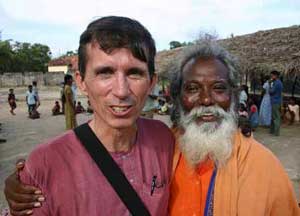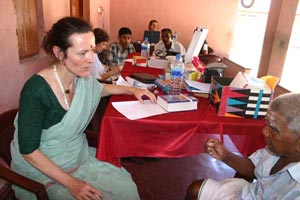
|
|||||||||
|
| |||||||||
Origin of the Anathi Project
The Kataragama Pada Yatra, an age old tradition of barefoot pilgrimage following the entire east coast of Sri Lanka to the Kataragama shrine annually in June-July, has attracted a few foreign devotees in recent decades. One of them, Patrick Harrigan, has walked twenty times since 1972, and almost every year one or two other foreigners participate. Dinah Barton of the UK, for instance, has participated thrice since 1999. After the Tsunami catastrophe of December 2004, Pada Yatra devotees including Patrick and Dinah raised funds through friends and family and rushed to the east coast to see what they could do to relieve suffering in the coastal areas known well to them from the Pada Yatra. Soon other foreign volunteers asked to join, on the understanding that they should be self-supporting and able to source their own funds for mini relief projects undertaken to help individual families affected by Tsunami. Our relief activity was unplanned, informal, and without an organization or bank account. These relief activities came to be known as the 'Anathi Project', an all-volunteer effort based in Batticaloa, whose principal aim was to help needy children on the East Coast. The work of its volunteers (coordinated by Patrick Harrigan and Dinah Barton) attracted the attention of individual donors and donor societies abroad in Germany (Homeopaths Without Borders, the City of Munich, Knorr-Bremse Global Care), the UK (Llanwyrdt Wells Tsunami Appeal), and Canada (Kiwanis EE&C Division 18), who expressed interest in undertaking joint long-term projects to help children of the east coast. The expressions of interest from foreign donors eventually resulted in the formation of a formal public trust, the Sri Lanka Children's Trust, in late December 2005 after it became clear that, for our work to continue and grow and comply with laws applicable to such charity work, it would have to become a registered society with a Board of Trustees, regular Board meetings, bank accounts, and regularly maintained and audited accounts. The Board of the Sri Lanka Children's Trust held its first meeting on 17 January 2006, and shortly thereafter applied to be recognized as a local NGO and opened its bank account (no. 3261940) at Bank of Ceylon in Batticaloa. Anathi Project volunteers work closely with children's institutions to identify children's needs in the areas of health, nutrition, sanitation and education. The volunteers would then design small programs or mini-projects directed towards these needs, typically using funds that the volunteers themselves have raised abroad and brought to Sri Lanka, or by appealing to external donors for assistance. Download complete details about the Anathi Project as a PDF file.
|

